Class 10 Exam > Class 10 Notes > English Language for GCSE/IGCSE > Demo Answer: Descriptive Writing
Demo Answer: Descriptive Writing | English Language for GCSE/IGCSE - Class 10 PDF Download
| Table of contents |

|
| Introduction |

|
| Planning your descriptive writing |

|
| Descriptive writing model answer |

|
| Unannotated model answer |

|
| Summary |

|
Introduction
Assignment 2 of your coursework portfolio is the descriptive writing assignment. The following guide will provide you with a descriptive writing model answer and is divided into:
- Planning your descriptive writing
- Descriptive writing model answer
- Unannotated model answer
- Summary
Planning your descriptive writing
Let's consider the following descriptive writing task as an illustration for your coursework:
"Describe the experience of attempting to sleep before a significant day."
We can employ the "panoramic, zoom, single line, shift, shift, panoramic" six-step strategy to organize our response:
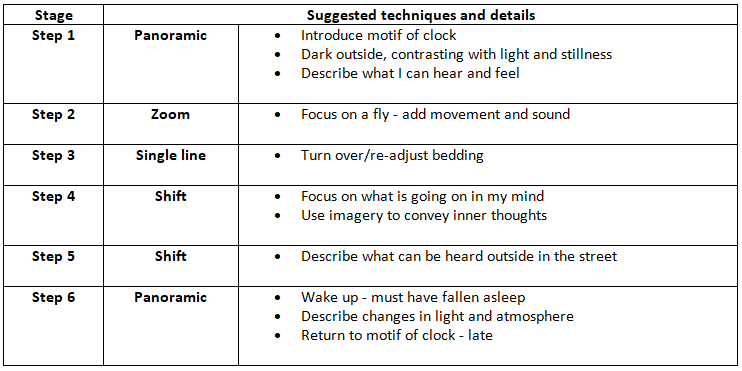
Descriptive writing model answer
The following model answer demonstrates how to structure, and what to include in, a top-mark response to the above task:
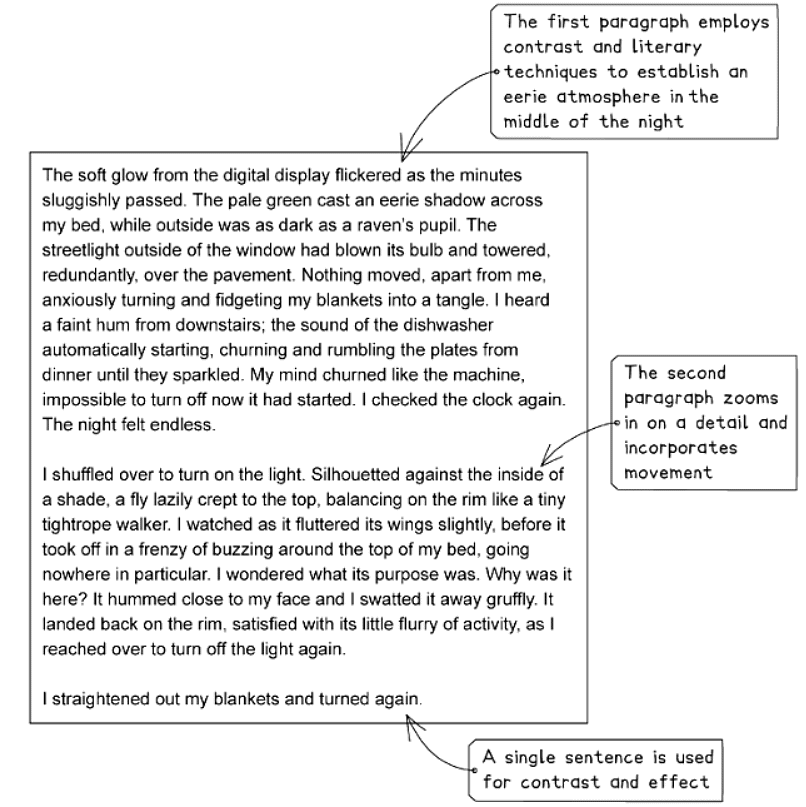
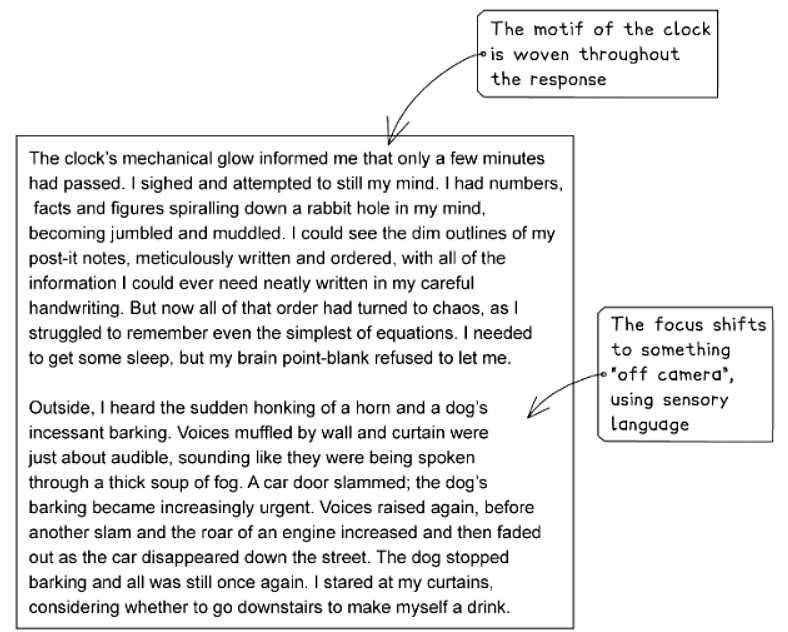
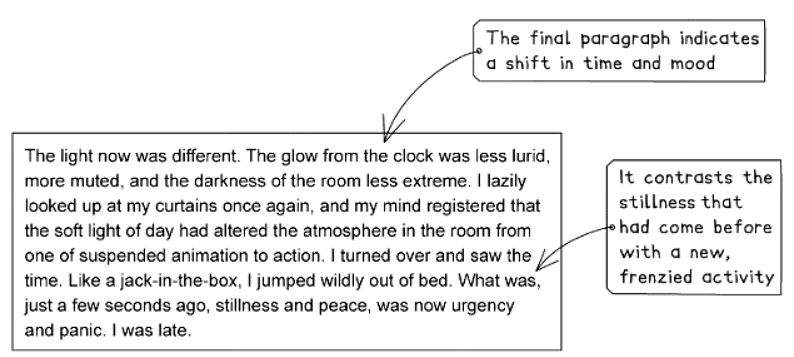
Unannotated model answer
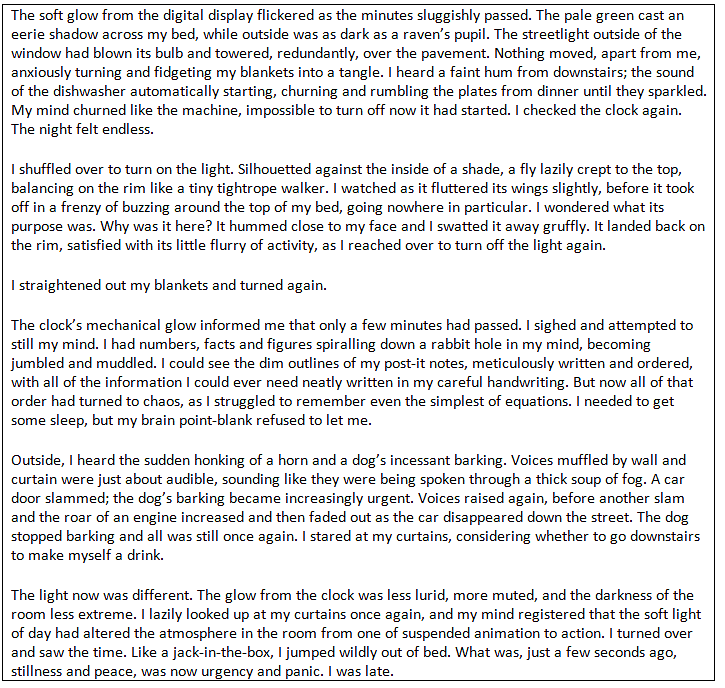
Commentary:
- The first paragraph skillfully uses contrast and literary techniques to set up a mysterious nighttime ambiance.
- In the second paragraph, there is a focus on intricate details and the incorporation of movement to enhance the narrative.
- A single impactful sentence is used for contrast and emphasis within the response.
- Throughout the writing, the motif of the clock is consistently integrated.
- Sensory language is employed when shifting the focus to something 'off camera', adding depth to the description.
- The final paragraph indicates a change in both time and mood, juxtaposing stillness with activity for effect.
Summary
- When describing a scene, imagine viewing it through a camera lens.
- Use sensory language, varying perspectives, figurative language, and contrasts to enhance your writing.
- Avoid including dialogue in your descriptive passages.
- Keep your writing engaging by varying your sentence and paragraph lengths.
- Add movement to your descriptions to make them more vivid and dynamic.
The document Demo Answer: Descriptive Writing | English Language for GCSE/IGCSE - Class 10 is a part of the Class 10 Course English Language for GCSE/IGCSE.
All you need of Class 10 at this link: Class 10
|
16 videos|45 docs
|
FAQs on Demo Answer: Descriptive Writing - English Language for GCSE/IGCSE - Class 10
| 1. What are some tips for planning descriptive writing? |  |
Ans. Some tips for planning descriptive writing include brainstorming ideas, creating an outline, focusing on sensory details, using descriptive language, and revising and editing the final piece.
| 2. How can I make my descriptive writing more vivid and engaging? |  |
Ans. To make your descriptive writing more vivid and engaging, try using specific and descriptive language, incorporating sensory details, utilizing vivid imagery, and engaging the reader's emotions.
| 3. What are some common mistakes to avoid in descriptive writing? |  |
Ans. Common mistakes to avoid in descriptive writing include using cliches, overusing adjectives, neglecting to show rather than tell, lacking organization, and not revising for clarity and effectiveness.
| 4. How can I improve my descriptive writing skills? |  |
Ans. To improve your descriptive writing skills, consider reading examples of well-written descriptive pieces, practice writing regularly, seek feedback from others, experiment with different writing techniques, and revise your work to enhance clarity and impact.
| 5. What are some effective ways to create a strong descriptive setting in writing? |  |
Ans. Some effective ways to create a strong descriptive setting in writing include focusing on sensory details, using vivid descriptions of the environment, incorporating the setting into the story's mood and tone, and allowing the setting to enhance the overall atmosphere of the piece.
Related Searches




















